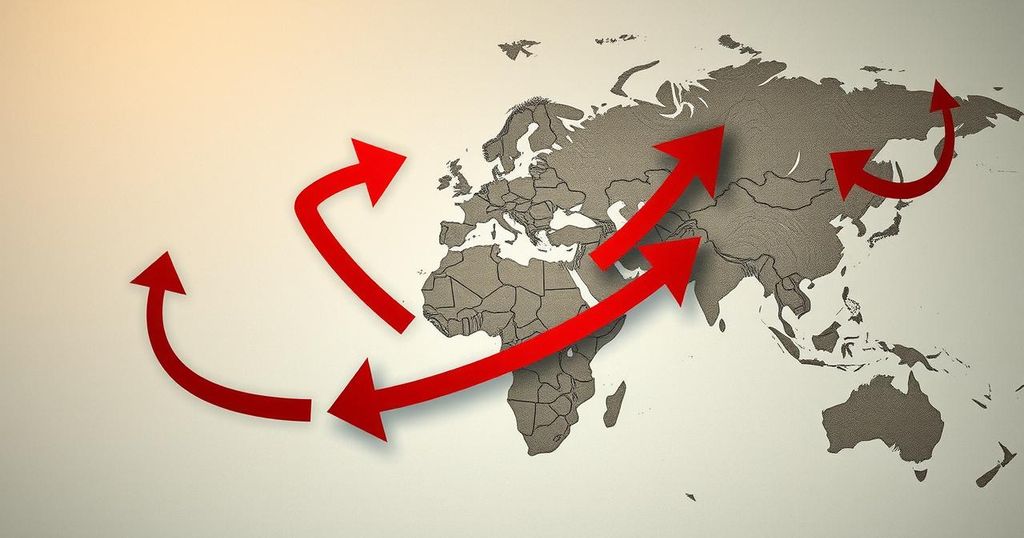Challenges Facing Trump’s Controversial Gaza Plan
President Trump’s controversial plan to relocate Palestinians from Gaza to transform the region into a tourist area has sparked significant backlash. Many view it as ethnic cleansing, undermining Palestinian aspirations for statehood. Arab nations have swiftly condemned the proposal, fearing regional instability. The prospects of negotiations regarding this plan reveal complex political tensions, raising concerns over current ceasefires and the fate of hostages amid ongoing conflicts in the region.
President Donald Trump’s proposed plan to forcibly relocate Palestinians from the Gaza Strip aims to transform the region into a tourist hub. However, this initiative faces substantial challenges. Palestinian leaders and the international community perceive such actions as ethnic cleansing, directly undermining decades of struggles for Palestinian statehood, and rejecting Trump’s insistence that Arab nations accept more refugees.
Neighboring Arab countries, including Egypt and Jordan, firmly denounce the plan, fearing it could lead to a repeat of historical instability marked by the influx of Palestinian refugees. Both nations have expressed that their economies cannot accommodate large numbers of new arrivals and condemned Trump’s notion of facilitating resettlement. Following a rapid rejection from Saudi Arabia, which emphasized that it would not normalize relations with Israel without a Palestinian state, additional regional responses have mirrored this disapproval.
The concept of transferring Palestinians contradicts their deep-rooted connection to the land, as Gaza is a crucial part of their national identity. Most residents are descendants of those displaced in the 1948 conflict surrounding Israel’s establishment. Palestinian leaders assert their right to remain on their ancestral land, with the ambassador to the UN suggesting if relocation is a goal, Palestinians should return to their homes in Israel.
The repercussions of such a transfer proposal could jeopardize the current ceasefire and negotiations over hostages taken by Hamas. The plan seeks to dismiss longstanding Palestinian aspirations for statehood and could trigger further conflict. Despite Trump’s claims of facilitating the ceasefire, the likelihood of it holding firm amid such proposals appears tenuous.
Israeli leadership displays mixed reactions to the plan, with Prime Minister Netanyahu acknowledging Trump’s unorthodox thought process while others like Benny Gantz have noted the idea merits exploration. Opposition leader Yair Lapid emphasizes prioritizing hostage situations over proposals lacking detailed outlines. As the ceasefire negotiations continue, the fate of hostages remains uncertain amid pressures of both release and broader strategic objectives.
Trump’s proposal may serve as an opening gambit in broader negotiations geared towards establishing a Middle East mega-deal. Historical precedents indicate that early statements may lead to revisions based on negotiations and regional feedback, though current Arab responses suggest a firm boundary against transfer proposals. With a meeting scheduled between Trump and King Abdullah II of Jordan, future clarity on this issue may emerge soon.
The proposal outlined by President Trump to relocate Palestinians from Gaza has evoked strong reactions throughout the region. The suggestion comes post-conflict and amid ongoing humanitarian crises, with significant numbers of people displaced. The concept starkly challenges the identities and aspirations of the Palestinian population, accentuating fears of ethnic cleansing while simultaneously complicating relations with neighboring Arab states, which have historically rejected resettlement of Palestinian refugees within their borders. Trump’s plan potentially jeopardizes existing ceasefires and hostage negotiations, impacting the broader geopolitical dynamics in the region.
In conclusion, Trump’s Gaza proposal faces significant resistance from both Palestinians and Arab nations, highlighting deep-seated fears of ethnic cleansing and destabilization. It undermines the quest for Palestinian statehood while complicating current ceasefire agreements and hostage negotiations. The mixed responses from Israeli political leaders suggest that the plan may not gain unanimous support. Moreover, it exists within a turbulent regional context, where economic and political dynamics shape responses to such drastic proposals, indicating that further dialogue will be essential moving forward.
Original Source: apnews.com








Post Comment